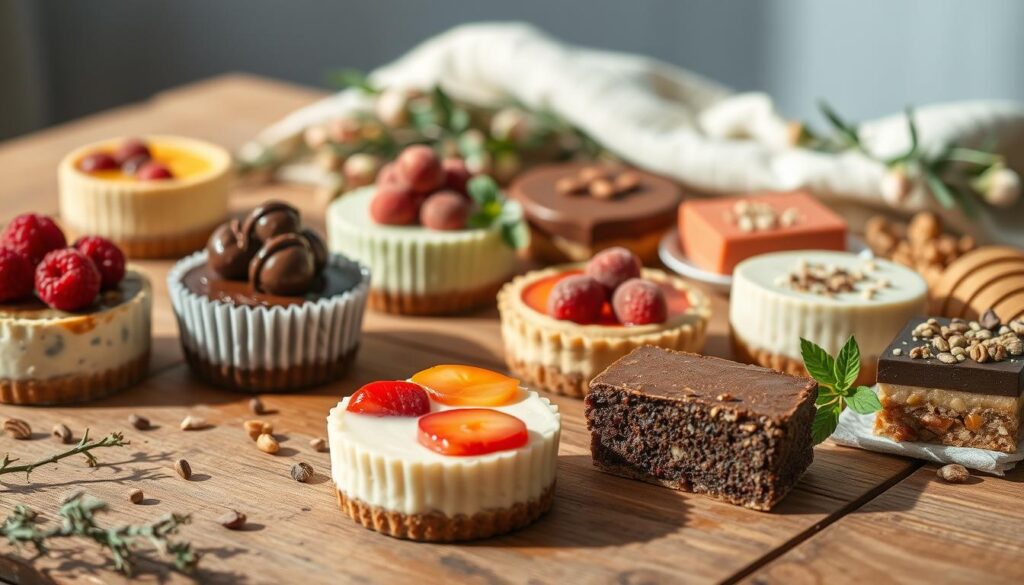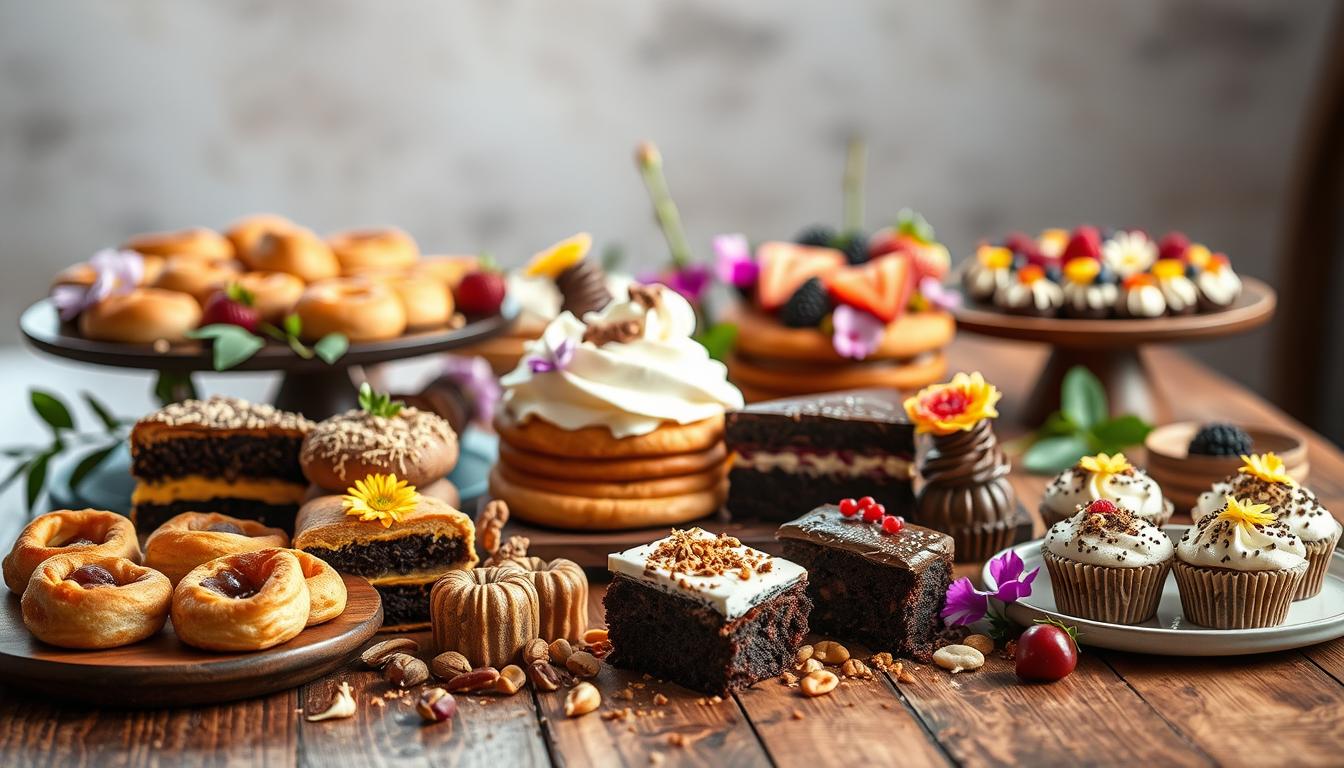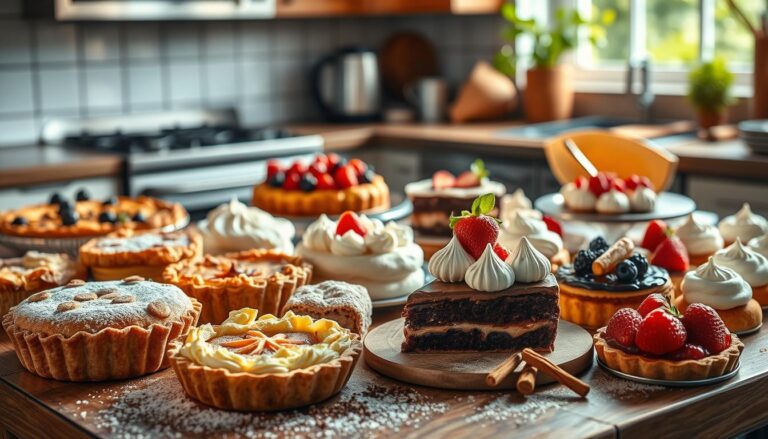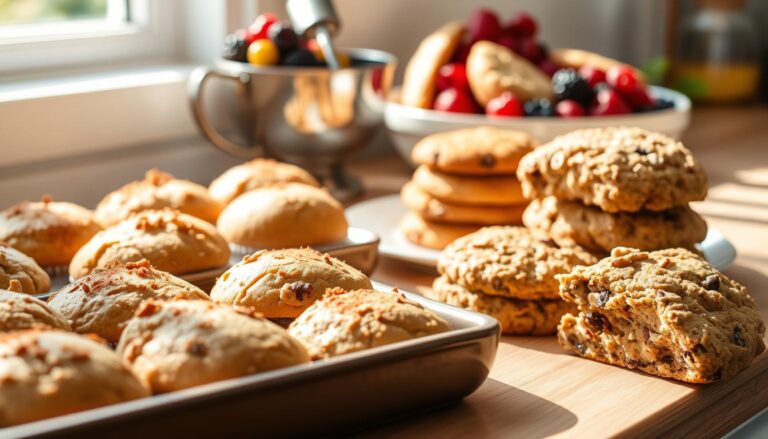Vegan Baking: Delicious Plant-Based Recipes for Every Sweet Tooth
Every time I went to a bakery, I felt left out. Traditional desserts didn’t fit my plant-based lifestyle. But then, I found vegan baking. It’s where kindness meets amazing taste.
Vegan baking has changed how we see desserts. It’s for those who avoid animal products or want healthier treats. These recipes show that you can enjoy delicious, kind desserts. From chocolate cakes to pastries, there’s something special for everyone.
Starting your vegan baking journey opens up a world of creativity. Ingredients like fruits, nuts, and oats become magic. They make desserts that are sweet and full of flavor.
Key Takeaways
- Vegan baking offers guilt-free indulgence
- Plant-based desserts can be incredibly delicious
- Whole-food ingredients create rich, complex flavors
- Ethical eating doesn’t mean sacrificing taste
- Anyone can master vegan baking techniques
Understanding Plant-Based Dessert Fundamentals
Vegan baking turns old recipes into tasty treats that everyone loves. It’s great for both experienced bakers and newbies. Learning about vegan substitutes and techniques can change how you bake desserts.
Starting with vegan baking means knowing some key points. These points make vegan desserts yummy and good for you. Let’s look at the basics to make delicious treats.
Common Vegan Substitutes for Eggs and Dairy
It’s important to swap out old ingredients for new ones in vegan baking. Here are some great vegan substitutes that keep things tasty and right:
- Flax eggs: Ground flaxseed mixed with water acts as a binder
- Applesauce: Adds moisture and sweetness
- Aquafaba: Chickpea liquid is a great egg white substitute
- Plant-based milks: Almond, soy, and oat milk work like dairy
- Coconut oil: Replaces butter with a rich texture
Essential Equipment for Vegan Baking
The right tools are key for making perfect vegan desserts. Get quality equipment that helps with vegan baking:
- High-quality non-stick baking pans
- Silicone spatulas for gentle mixing
- Digital kitchen scale for accurate measurements
- Parchment paper for easy release
- Reliable stand mixer or hand mixer
Understanding Texture and Moisture Balance
Getting the right texture in vegan baking can be tricky. Plant-based ingredients act differently than traditional ones. Use methods to avoid dryness and make desserts tender and moist.
Try different vegan substitutes to find the best mix. Ingredients like chia seeds, mashed bananas, and nut butters can add moisture. They help make your vegan treats rich and satisfying.
The Art of Vegan Baking: Techniques and Tips
Mastering vegan baking takes creativity and precision. It’s all about understanding the special qualities of plant-based ingredients. With the right tips, your vegan baking journey can be fun and rewarding.
Knowing how to swap out traditional ingredients is key. The right substitutions can change the taste and texture of your baked goods.
- Use aquafaba as an egg replacement for meringues and mousses
- Select high-quality plant-based milk alternatives
- Experiment with different binding agents like ground flaxseed
- Learn to balance moisture in gluten-free vegan recipes
Getting the measurements right is important in vegan baking. It helps you get consistent results every time you bake.
| Ingredient | Traditional Replacement | Baking Purpose |
|---|---|---|
| Eggs | Mashed banana | Binding and moisture |
| Butter | Coconut oil | Fat content and texture |
| Milk | Almond milk | Liquid base |
“Vegan baking is an art of transformation, turning plant-based ingredients into magical, delicious creations.” – Professional Pastry Chef
Remember, practice is key. The more you bake, the better you’ll get. Don’t be afraid to try new things and adjust recipes to fit your vegan lifestyle.
Natural Sweeteners in Plant-Based Desserts
Discovering the right natural sweeteners can make your vegan baking amazing. Vegan sugar alternatives are not just sweet. They also offer nutritional benefits that regular sugar can’t.
Exploring natural sweeteners opens up a world of delicious options. These plant-based alternatives add unique flavors and nutrition to your desserts.
Working with Maple Syrup and Dates
Maple syrup and dates are top choices for vegan baking. They add rich flavors and extra nutrients to your recipes.
- Maple Syrup: Offers a deep, caramel-like sweetness
- Dates: Provide natural sugar with fiber and minerals
- Both create moisture in baked goods
Coconut Sugar and Alternative Sweeteners
Coconut sugar is a popular vegan sugar alternative. It has a low glycemic index and a subtle caramel taste that works well in desserts.
| Sweetener | Glycemic Index | Nutrient Profile |
|---|---|---|
| Maple Syrup | 54 | Zinc, Manganese |
| Coconut Sugar | 35 | Iron, Zinc, Calcium |
| Date Paste | 42 | Potassium, Fiber |
Proper Measurements and Conversions
It’s important to know how to measure natural sweeteners. Each one needs a little adjustment in your recipe for the right texture and sweetness.
- Reduce liquid ingredients when using liquid sweeteners
- Use a 1:1 ratio for coconut sugar in most recipes
- Experiment with small batches to find ideal proportions
Pro tip: Start with small quantities and adjust to taste when experimenting with natural sweeteners in your vegan desserts.
Essential Ingredients for Successful Vegan Desserts
Making delicious vegan desserts begins with the right ingredients. Your pantry is key to creating tasty treats that are animal-free. These treats satisfy every sweet tooth.
Choosing the right vegan baking ingredients is critical. You need to know which substitutes will make your recipes amazing.
- Plant-Based Milks: Almond, soy, oat, and coconut milk offer unique characteristics for different baked goods
- Binding Agents: Flax eggs, chia seeds, and aquafaba replace traditional eggs
- Oils and Fats: Coconut oil, avocado, and nut butters provide moisture and richness
“The secret to great vegan baking is understanding how each ingredient functions” – Professional Vegan Pastry Chef
Specialty flours like almond, coconut, and cassava can make your vegan baking better. They add unique flavors and health benefits that regular flour can’t.
| Ingredient | Primary Function | Best Used In |
|---|---|---|
| Aquafaba | Egg White Replacement | Meringues, Macarons |
| Nutritional Yeast | Flavor Enhancement | Cheesy Desserts |
Having the right plant-based baking essentials will change how you make desserts. Try out these ingredients to make vegan treats that everyone will enjoy.
Gluten-Free Options in Vegan Baking
Exploring gluten-free vegan baking opens a world of tasty options for those with dietary needs. Alternative flours have changed plant-based baking. Now, you can make delicious treats that are good for you and taste great.
Finding your way in gluten-free vegan baking might seem hard. But with the right tips, you’ll soon make yummy desserts for everyone to love.
Best Flour Combinations for Gluten-Free Vegan Baking
Finding the perfect gluten-free flour mix is key. It’s about knowing each flour’s special traits. Here are some top picks:
- Almond flour + rice flour for light, tender baked goods
- Coconut flour + cassava flour for moisture-rich recipes
- Chickpea flour + tapioca starch for increased protein and binding
Texture Enhancement Techniques
Getting the right texture in gluten-free vegan baking needs special tricks:
- Use xanthan gum or psyllium husk as binding agents
- Add extra moisture through applesauce or mashed banana
- Rest batters to allow alternative flours to absorb liquid
Working with Alternative Flours
Different alternative flours add special touches to your baking:
| Flour Type | Flavor Profile | Best Uses |
|---|---|---|
| Almond Flour | Nutty, rich | Cookies, cakes, pie crusts |
| Coconut Flour | Sweet, tropical | Muffins, quick breads |
| Cassava Flour | Neutral | Pancakes, crepes |
Get creative with gluten-free vegan baking by trying out these flours. Your taste buds will love the journey!
Quick and Easy No-Bake Vegan Treats

Summer heat doesn’t mean you can’t enjoy delicious desserts. No-bake vegan desserts are perfect for satisfying your sweet tooth without using the oven. These treats are quick to make, delicious, and nutritious.
Making no-bake vegan desserts is easier than you think. With just a few ingredients and a little time, you can make amazing treats. These will impress both vegans and non-vegans.
- Energy balls packed with nuts and dates
- Raw cashew cheesecakes
- Chocolate truffles
- Fruit and nut bars
No-bake vegan treats are versatile. You can easily customize ingredients to match your taste preferences or dietary needs. Ingredients like coconut cream, cacao powder, and plant-based milk create rich, creamy textures without dairy.
“No-bake desserts are a game-changer for home bakers looking for quick, delicious vegan options.” – Plant-Based Chef Magazine
Pro tip: Always use high-quality ingredients for the best flavor in your no-bake vegan desserts. Fresh nuts, organic dates, and premium dark chocolate can make your treats extraordinary.
Mastering Vegan Chocolate Desserts
Chocolate lovers rejoice! Vegan chocolate desserts are not just possible—they’re absolutely delectable. Whether you’re committed to a plant-based lifestyle or simply exploring dairy-free chocolate treats, you’ll discover a world of rich, indulgent flavors waiting to be explored.
Creating exceptional vegan chocolate desserts requires understanding a few key principles. Dark chocolate is often naturally vegan, making it an excellent base for your sweet creations. The secret lies in selecting high-quality chocolate and knowing how to transform it into decadent treats.
Selecting Premium Dark Chocolate
When choosing dark chocolate for your vegan desserts, look for these characteristics:
- At least 70% cocoa content
- Minimal ingredient list
- Certified vegan label
- Organic and fair-trade options
Crafting Luxurious Ganaches and Frostings
Transform your dairy-free chocolate treats with these game-changing techniques:
- Use coconut milk for creamy ganache
- Blend cashews for smooth frosting
- Incorporate avocado for rich texture
- Experiment with aquafaba for light, fluffy consistencies
“Vegan chocolate desserts prove that plant-based baking can be just as indulgent and satisfying as traditional recipes.” – Pastry Chef Emma Rodriguez
Your vegan chocolate desserts will shine when you master these techniques. Remember, creativity and quality ingredients are the keys to developing irresistible plant-based chocolate delights.
Seasonal Fruit-Based Vegan Desserts

Discover the joy of seasonal vegan baking by making desserts with fresh fruits. These desserts are not only tasty but also packed with nutrients. They celebrate the sweetness of nature all year round.
When making seasonal vegan baking recipes, pick fruits at their best. Each season offers a chance to make delicious treats:
- Spring: Strawberry and rhubarb crumbles
- Summer: Peach cobbler and mixed berry pies
- Autumn: Spiced apple galettes
- Winter: Citrus-infused tarts
For amazing fruit-based vegan desserts, choose ripe, local fruits. Try using plant-based binders like chia seeds or applesauce. They replace eggs and keep your desserts moist and tasty.
Preserving fruits lets you enjoy them all year. Freeze summer berries or can autumn apples. This way, you can make vegan desserts even when fruits are out of season.
Pro tip: Always adjust sugar levels based on the natural sweetness of your chosen seasonal fruits.
Make your fruit-based vegan desserts stand out by knowing each fruit’s special traits. Use their natural flavors to make your seasonal vegan baking even more exciting.
Troubleshooting Common Vegan Baking Issues
Vegan baking can be tricky, even for seasoned bakers. Knowing common issues helps you find solutions. This way, you can make tasty, perfect desserts.
Managing moisture is key when baking vegan. Dry or crumbly treats often come from too little liquid or wrong flour mix. Finding the right substitutes is essential.
- Use applesauce or mashed bananas to increase moisture
- Experiment with different plant-based milk alternatives
- Add extra binding agents like ground flaxseed
- Adjust liquid-to-dry ingredient proportions carefully
Dense cakes are a common problem. To get a lighter texture, try these tips:
- Sift dry ingredients thoroughly
- Use fresh leavening agents like baking powder
- Gently fold ingredients to maintain air pockets
- Allow batter to rest before baking
Binding ingredients is another big challenge. Chia seeds, aquafaba, and commercial egg replacers can greatly help. They make your baked goods better.
“Patience and experimentation are key to mastering vegan baking techniques.” – Professional Vegan Baker
Every recipe needs tweaking. Being open to change and learning will turn baking problems into great results.
Storage and Preservation Tips for Vegan Baked Goods
Keeping your vegan baked goods fresh is key. The right storage can greatly improve their quality. This is important for homemade treats.
Knowing how to store plant-based baked goods is vital. It helps them last longer and stay tasty. Gluten-free vegan desserts are extra delicate and don’t last as long as others.
Proper Cooling Techniques
Before you store your vegan desserts, cool them down first:
- Let them cool completely at room temperature
- Take them out of the baking pan to avoid moisture
- Use cooling racks for even air flow
Effective Wrapping Methods
Keeping your vegan treats away from air and moisture is essential:
- Put them in airtight containers with tight lids
- Wrap each item in parchment paper or plastic wrap
- Use wax paper between layers to stop sticking
Freezing Guidelines
Freezing is a great way to store vegan desserts for a long time. Here are some tips for the best results:
- Wrap them tightly in plastic wrap and then foil
- Mark containers with the date and dessert type
- Most vegan baked goods can be frozen for up to 3 months
- Thaw at room temperature to avoid moisture
By using these storage and preservation methods, your vegan baked goods will stay delicious and fresh for a long time.
Conclusion
Starting a vegan baking journey opens up a world of creativity and tasty treats. You’ve learned that exploring plant-based desserts is not about limits. It’s about making classic treats with new ingredients and methods.
Your skills in vegan baking show that cooking with care can be fun and tasty. You’ve learned about different ingredients, textures, and flavors. Now, you can make desserts that everyone will love, whether they eat vegan or not.
Every recipe and method you’ve tried is a step towards better baking. By using plant-based ingredients, you’re making yummy desserts and helping the planet. Your vegan baking journey is all about growth, learning, and finding new flavors.
We encourage you to keep exploring, sharing your creations, and trying new things in baking. Your kitchen is a place to make delicious, caring, and creative desserts. These desserts can change how we see sweet treats.







